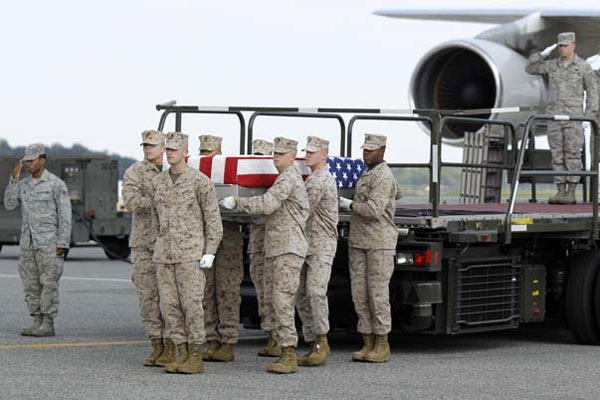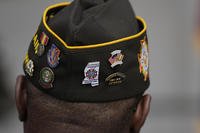Afghans thought to be allies have now killed more than 100 U.S. and coalition troops, and pose a threat to building partnerships between Afghan and NATO forces prior to the U.S. pullout in 2014, said Defense Secretary Leon Panetta.
"I've been very concerned about these incidents … because of the lives lost and because of the potential damage to our partnership efforts," Panetta said Tuesday.
Six Marines died Aug. 10 in two separate shootings -- in both cases the suspected shooters were supposedly members of Afghan security forces. In one attack, an alleged Afghan police officer shot and killed three members of the Marine Corps Force Special Operations Command deployed to the Helmand Province.
NATO and Pentagon officials have blamed a few "bad apples" in the Afghan ranks for the spike in what the military is now calling "insider attacks" rather than "green-on-blue" attacks. Chairman of the Joint Chiefs of Staff Gen. Martin Dempsey and Panetta explained the previous term took for granted how Afghan soldiers and police officers have been targeted in these attacks as well.
"We shouldn't forget that the Afghans themselves are targets to these kinds of attacks as well," Panetta said.
The U.S. defense secretary highlighted the steps U.S. and coalition troops have taken to protect themselves to include meetings U.S. Gen. John Allen, commander of the NATO-led coalition force in Afghanistan, has had with Afghan national security ministers and village elders.
Panetta said U.S. and Afghan forces continue to use an eight-step vetting process to root out potential recruits connected to the Taliban. He also pointed to a boost in counter intelligence personnel, increased training requirements, and what's called the Guardian Angel program as steps taken toward protecting U.S. and coalition troops.
"This recent green on blue has been awfully, awfully troubling" and poses a grave challenge to Allen and shaping the transition to the Afghan lead on security, said Air Force Maj. Gen. Tod Wolters, the former deputy commander for Air, U.S. Forces-Afghanistan.
"There's a degree of trust that [the Afghans] are your brothers," and then "some yo-yo goes off and does something stupid," Wolters said in a briefing Tuesday for the Air Force Association.
Allen must now rethink his planning for how many U.S. and coalition troops will work within Afghan units during the troop drawdown, and "the smallest ratio change can be a huge driver" in the effectiveness of the force, said Wolters, now the legislative liaison to Congress for the Air Force.
"There lies the challenge with respect to the trust factor," Wolters said.
James Cunningham, the new U.S. Ambassador to Afghanistan, said Monday that the rash of recent incidents was eroding "confidence and trust" in the partnership between the allies and the Afghans.
"It's obviously very troubling, not just to us, but it's also very troubling to our Afghan partners," Cunningham said in his first public comments since taking over the Kabul diplomatic post from Ryan Crocker.
"There's a lot of work being done to understand why this is happening," Cunningham said. "Obviously, this undermines or attacks that confidence and trust."
At least 107 U.S. and NATO troops have been killed in insider attacks since 2007, according to Defense Department and International Security and Assistance Force statistics.
From 2007 through 2011, at least 70 coalition troops were killed, and 37 more have lost their lives in 27 attacks in 2012. The tally for insider attacks has already surpassed the bar set in 2011 when U.S. and coalition units lost 35 troops.
Panetta and Dempsey renewed their assertion that the attacks were "isolated incidents" in a growing overall Afghan National Security Force of soldiers and police now approaching 350,000 in total strength.
"These incidents that now involve 31 Afghans do not reflect the pride and dedication of the 350,000 soldiers and police of the Afghan National Security Forces," Panetta said.
German Brig. Gen. Gunter Katz, an ISAF spokesman, said most of these incidents don't necessarily occur because of connections to the Taliban.
"Most of these incidents were caused by personal grievances, by a stress situation, or by battle fatigue," Katz said at a briefing in Kabul on Monday.
The incidents have not caused the allies to reconsider the 2014 withdrawal timeline for combat troops or contemplate an overhaul of the ways in which Afghan and allied troops interact, said George Little, a Pentagon spokesman.
Instead, "the focus has been on improving the vetting process" for Afghan recruits. "We're committed to strengthening that process as we go forward," Little said Monday.
The vetting process has been targeted for improvement for more than a year. Panetta said investigators do forensics on each killing to figure out where the vetting process failed and how the U.S. and coalition forces can improve it.
The U.S. military introduced the Guardian Angel program in which at least one soldier acts in the role of a military "designated driver" to be on guard when troops are in the presence of Afghans, Army leaders announced to Congress in May 2011.
Army Brig. Gen. Stephen Townsend, director of the Pakistan/Afghanistan Coordination Cell, told a House hearing that it was impossible to devise a "fail-safe system" for stopping insider attacks but "you can always post a guard to over watch what they're doing if at any time they feel the threat warrants it."
Guardian Angels carry weapons when other troops would be unarmed in dealings with the Afghans. "This guardian angel is prepared to fight, and he's in a position of advantage to over watch that activity, and that's what he does," Townsend said.



























